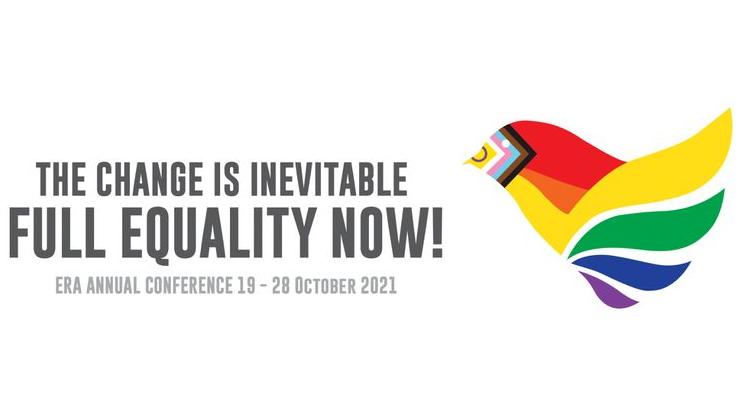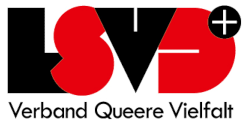Widerstandsfähigkeit und Nachhaltigkeit: LSBTI-Community auf dem Westbalkan und der Türkei
Jahreskonferenz von unserem langjährigen Projektpartner ERA – LGBTI Equal Rights Association

Die Equal Rights Association (ERA) ist eine der langjährigen Projekt-Partner*innen unserer Hirschfeld-Eddy-Stiftung. Sie ist eine Dachorganisation von über 70 regionalen LSBTI-Organisationen auf dem Westbalkan und in der Türkei. Unter dem Titel „The change is inevitable – Full Equality Now!“ (Der Wandel ist unvermeidlich. Vollständige Gleichberechtigung jetzt!) fand nun die Jahres-Konferenz statt.
Vom 19. bis zum 29. Oktober 2021 tauschten sich über 100 Vertreter*innen verschiedener Organisationen und Institutionen in verschiedenen Themen-Foren digital aus. Zeitgleich mit einer zunehmenden Sichtbarkeit von LSBTI in der Region, haben auch die Angriffe aus Gruppen der Bevölkerung und von Regierungsseite deutlich zugenommen. Zudem hat die Corona-Pandemie die Community in der Region hart getroffen. Aus diesem Grund wurde auf der Konferenz vor allem diskutiert, wie die LSBTI-Bewegung wieder langfristig gestärkt werden kann. Die Konferenz wurde durch die Hirschfeld-Eddy-Stiftung des LSVD mit Mitteln des Auswärtigen Amts gefördert.
ERA hat uns den folgenden Bericht über die Konferenz mit vielen Links zu weiterführenden Informationen zugeschickt:
LGBTI rights far from fulfilled in the Western Balkans and Turkey: Regional ERA conference highlights challenges and demands of the community
ERA – LGBTI Equal Rights Association for the Western Balkans and Turkey, a network of 74 organizations, held on 19-28 October 2021 its fifth regional conference. Unlike previous years, due to the pandemic the event was held online and was attended by more than 100 participants from the LGBTI movement, governments, donors, media, academia and allies.
Recent developments in the region, and across the world, are showing that while LGBTI people are more visible than the past, they are now under increased attack from hostile governments and the public.
Democratic institutions are under threat in many countries of the region and the anti-gender movement is gaining more ground and strength. The ongoing Covid-19 pandemic has further exacerbated inequalities and has made access to rights and services for LGBTI people even harder.
Due to this situation, this year’s conference theme was Resilience and Sustainability. Local organisations have made considerable efforts to be close to the community in these difficult times, however, organisations have been impacted in the last two years by unstable funding, cuts to provision of services, and burnout among human rights defenders.
The conference, which was organised also with the support of the German Ministry of Foreign Affairs, focused on key topics for the LGBTI movement such as: resilience and sustainability, family rights, access to justice and countering the anti-gender movement. In addition a working panel was dedicated to the Regional LGBTI Intergovernmental Platform, which brought together government and other state representatives from 8 countries of the region.
The conference served to provide the donor community with important conclusions and recommendations, including the following:
- Support for LGBTI community should be localised, and dialogue should exist with local organisations to understand their needs and priorities;
- Shift funding to sustainable, long-term, activist programmes;
- Allocate funds for operative needs;
- Provide more resources for service provision vs. lobbying and advocacy.
Furthermore, specific recommendations were made also to governments of the region, including:
- Recognize the importance of LGBTIQ organisations as service providers, include them in relevant dialogues and treat them as equal actors;
- Ensure that access to services is available during times of crisis
- Work with LGBTIQ organisations and communities to create a “new normal” that does not return to the previous status quo of LGBTIQ inequality and discrimination.
Weitere Berichte
- Summary of the Conference
- Watch the panel on Resilience and Sustainability of the LGBTI+ movement in the Western Balkans and Turkey
- Watch the panel on the Changing Reality of Rainbow Families in the Western Balkans and Turkey
- Watch the panel on Access to Justice and Addressing Hate Crimes against LGBTI+ people
- Watch the panel on Countering the Anti-Gender Movement in the Western Balkans and Turkey region
- Watch the panel of the Regional Intergovernmental Meeting

